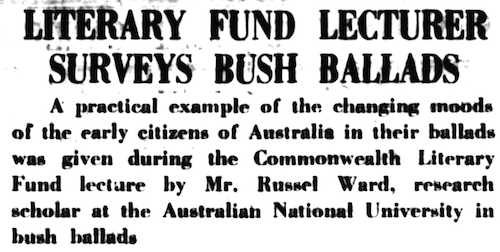

Literary Fund Lecturer Surveys Bush Ballads (1955)
A practical example of the changing moods of the early citizens of Australia in their ballads was given during the Commonwealth Literary Fund lecture by Mr. Russel Ward, research scholar at the Australian National University, in bush ballads.
Contending that a good ballad could not be divorced from its music, he emphasised his points by having key ballads in his lecture sung to guitar accompaniment by Mr. Harold Brokenshire.
Mr. Ward said Australian folk songs had little value as literature, and were less reliable as history, but they probably gave a more accurate picture of social attitudes than could be obtained in any other way.
Australia's founding fathers were an integral part of an old and very stable Society, and they tended to take for granted the basic assumptions on which that society rested.
Mr. Ward said this spirit quickly changed in"Australia. Respect for the squire, based on traditional obligations, which were at least to some extent mutual, was not transformed into respect for a commercial slave-master whose wealth was often ill-gotten and always recently acquired.
The first folk-song's composed in Australia reflected quite different feeling. The "moral", of the English songs was inverted. Honest men, it was felt, should defy authority, rather than subimit to it.
This happened because there was always a labour shortage in early Australia. New arrivals were reluctant to go to the bush and so the shortage of working hands was always more marked in the outbaek than in the towns. Far "up the country" even ticket-of-leave men sometimes combined successfully to force better conditions from their employers, while at the same time in England men were being transported for more peaceful forms of combination.
Long before the gold rushes, folk-lorecame to regard the bush-worker. ex-convict or free as the "typical Australian," truculently independent towards his employer; in proportion as he was dependent upon the collective strength of "mateship." The folk-hero was the "wild colonial boy" who robbed squatters and judges, fought policemen; and forever galloped over the plains with his fellow bushmen, he said.
In the 1880's and 1890's, the romanticised and idealised figure of the bushman captured the imagination of literary men. Writers like "Banjo" Paterson Lawson and Furphy helped to make "the man from farther out" into a symbol of Australian national feeling.
"In every country and age there is a considerable difference between men as they, are and men as they like to think they are. "In his cultural swag the bushman carried delusions of racial grandure as well as mateship; but most Australians seem well satisfied that, on the whole, the tradition is a good and a demdcratlc one," he said; One of the functions of the writer was to create traditions as the men of this Nineties did or at least to modify and develop theme. The fascination of the outback tradition could become morbid.
Many Australian poets now seemed able to work within the tradition without being dominated by it. Too many prose writers, however, still seemed more obsessed with tracing the lineaments of the "noble-bushman" in contemporary society, than in discovering what people were really like now."
Note
From the Canberra Times Friday 30 September 1955 p. 6.